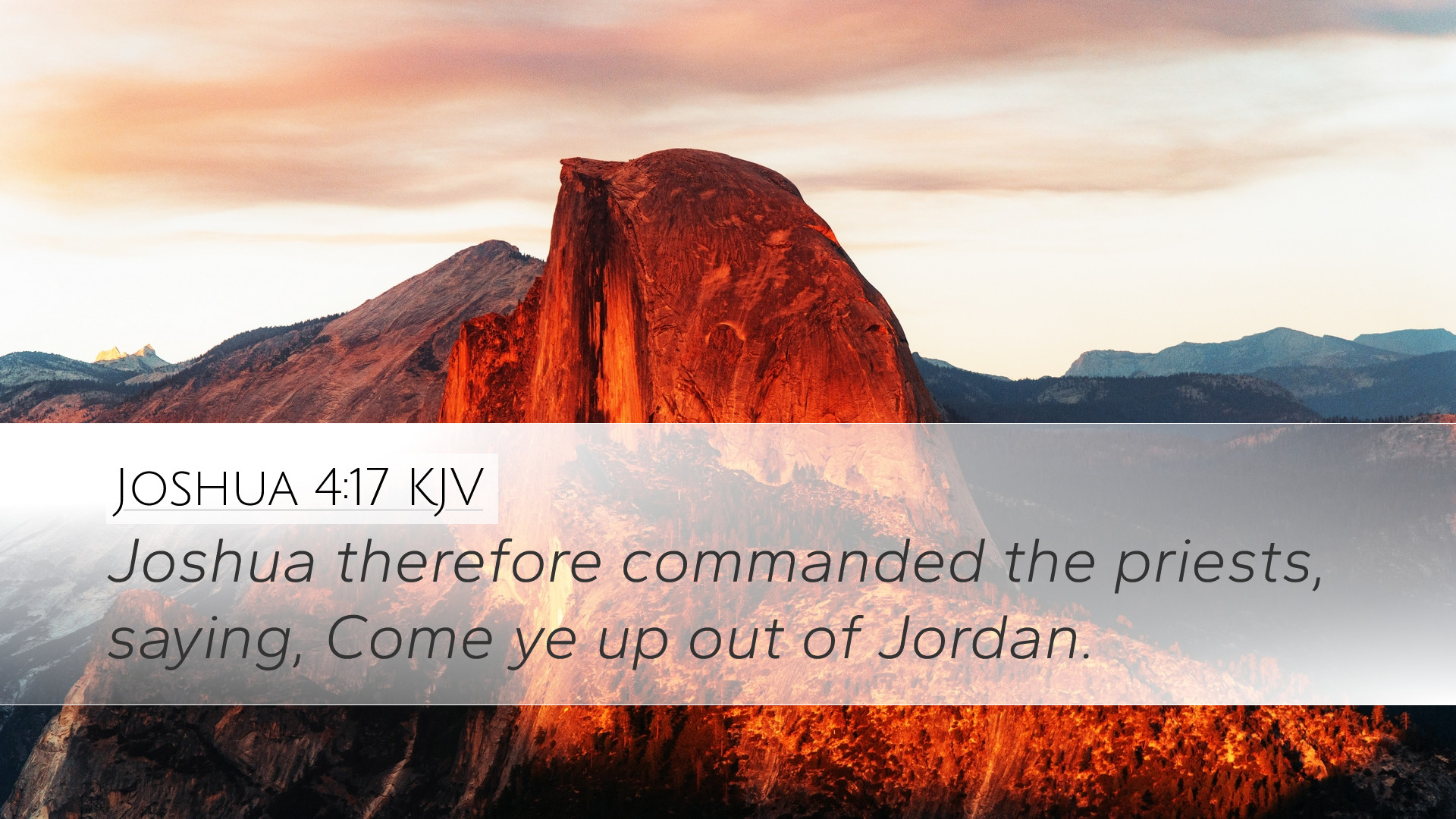Old Testament
Genesis Exodus Leviticus Numbers Deuteronomy Joshua Judges Ruth 1 Samuel 2 Samuel 1 Kings 2 Kings 1 Chronicles 2 Chronicles Ezra Nehemiah Esther Job Psalms Proverbs Ecclesiastes Song of Solomon Isaiah Jeremiah Lamentations Ezekiel Daniel Hosea Joel Amos Obadiah Jonah Micah Nahum Habakkuk Zephaniah Haggai Zechariah MalachiJoshua 4:17
Joshua 4:17 KJV
Joshua therefore commanded the priests, saying, Come ye up out of Jordan.
Joshua 4:17 Bible Commentary
Commentary on Joshua 4:17
Verse: "Joshua therefore commanded the priests, saying, 'Come up out of the Jordan.'" (Joshua 4:17, KJV)
Introduction
The verse encapsulates a pivotal moment in the history of Israel as they transition from wandering in the wilderness to entering the Promised Land. In this commentary, we will draw from various public domain sources to explore the implications, significance, and theological insights behind Joshua 4:17.
Contextual Overview
Joshua 4 narrates the account of the Israelites crossing the Jordan River under the leadership of Joshua, following the miraculous crossing that God enabled. This event is not merely a historical account but fulfills God's promise to His people as recorded throughout the Pentateuch. The command given in verse 17 is crucial as it signifies a transition, both physically and spiritually, for the Israelites.
Insights from Matthew Henry
Matthew Henry emphasizes the authoritative role of Joshua as a leader chosen by God. In his analysis, he highlights that Joshua's command to the priests to come out of the Jordan is an act of obedience and faith. The priests had carried the Ark of the Covenant into the Jordan's waters, and their obedience in this act was a precursor to the entire nation’s subsequent success.
Henry asserts the importance of divine timing and God’s intervention in the events leading to this moment. He notes, "God's people must acknowledge and celebrate the mercy shown in their deliverance." This command underlines that their journey was not merely a physical relocation but a spiritual undertaking that required adherence to God's orders.
Reflections from Albert Barnes
Albert Barnes presents a fine theological reflection on the symbolism of the Jordan River. He states that the Jordan serves as a metaphor for the barriers that believers face on their journey toward spiritual fulfillment and inheritance. The voice of Joshua calling the priests out of the river represents God's command for believers to step away from the struggles and enter into the blessings that God has prepared.
Barnes also reflects on the act of the priests bearing the Ark, linking it to Christ’s ultimate sacrifice. The Ark, representing God's presence, suggests that God's presence leads His people through trials, reaffirming that just as the priests came out of the waters, believers can triumph over their challenges through faith in God's provision.
Explorations by Adam Clarke
Adam Clarke provides a nuanced examination of the leadership demonstrated by Joshua in this passage. He observes that Joshua’s command signifies both closure and a new beginning. The priests represent mediators between God and the people, and their coming up indicates the completion of a significant act of faith. Clarke writes, "In completing one part of our spiritual journey, we are called to rise into new realms of faith."
Clarke’s insight extends to the idea that every Christian is called to be a kind of priest, as outlined in the New Testament. When the priests exited the Jordan, it signifies a call to ministry and service, reminding modern believers that coming out of our struggles leads us into areas where we can serve God and others fully.
Theological Implications
The theological significance of Joshua 4:17 extends beyond the historical narrative. It invites its readers—pastors, students, and scholars—to engage with the text as a living commentary on their journey of faith. There are several key implications to consider:
- The Role of Leadership: The command underscores the weight of responsibility that leadership entails. Joshua’s ability to direct the priests reflects the need for strong spiritual leadership today, where leaders must guide their congregations out of places of struggle and into spiritual abundance.
- God's Faithfulness: The passage reinforces the theme of divine faithfulness. As God led the Israelites through the Jordan, He continues to guide believers today through trials, encouraging faith that leads to eventual deliverance and victory.
- Obedience and Blessing: The priest's response to Joshua's command highlights the necessity of obedience in the life of faith. Compliance with God’s directive often precedes blessings that God promises to His followers.
- Covenantal Relationship: The verse reflects the covenant between God and Israel. The act of crossing the Jordan serves as a reminder of God's abiding covenant with His people, which spans through the ages to contemporary believers, emphasizing His relentless pursuit of relationship.
- Symbolism of Transition: Coming out of the Jordan is emblematic of leaving behind past struggles or disobedience and stepping into a new identity, a theme echoed throughout the Scriptures, particularly in the New Testament where baptism signifies death to an old life and rebirth into a new life in Christ.
Conclusion
Joshua 4:17 serves as a rich theological wellspring for understanding the nature of faith, obedience, and divine leadership. Drawing from Matthew Henry, Albert Barnes, and Adam Clarke provides a multi-dimensional view of both the historical context and the contemporary implications of this verse. It challenges readers to consider their own journeys—how they respond to God's call to rise out of their struggles and embrace the abundant life He promises.
As we contemplate this text, it reminds us that like Joshua's command to the priests, every believer is called to step out of their spiritual Jordan and into the fullness of God's promises.


